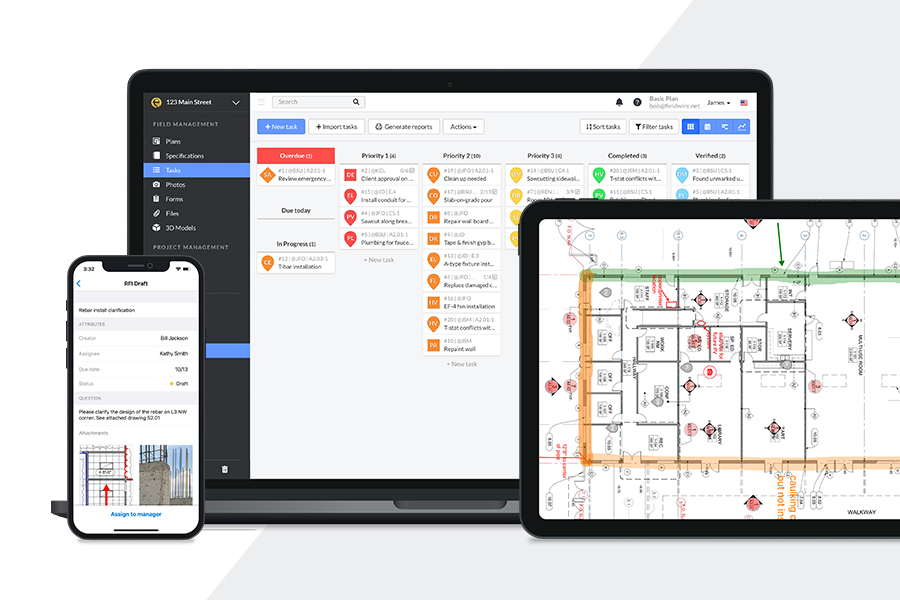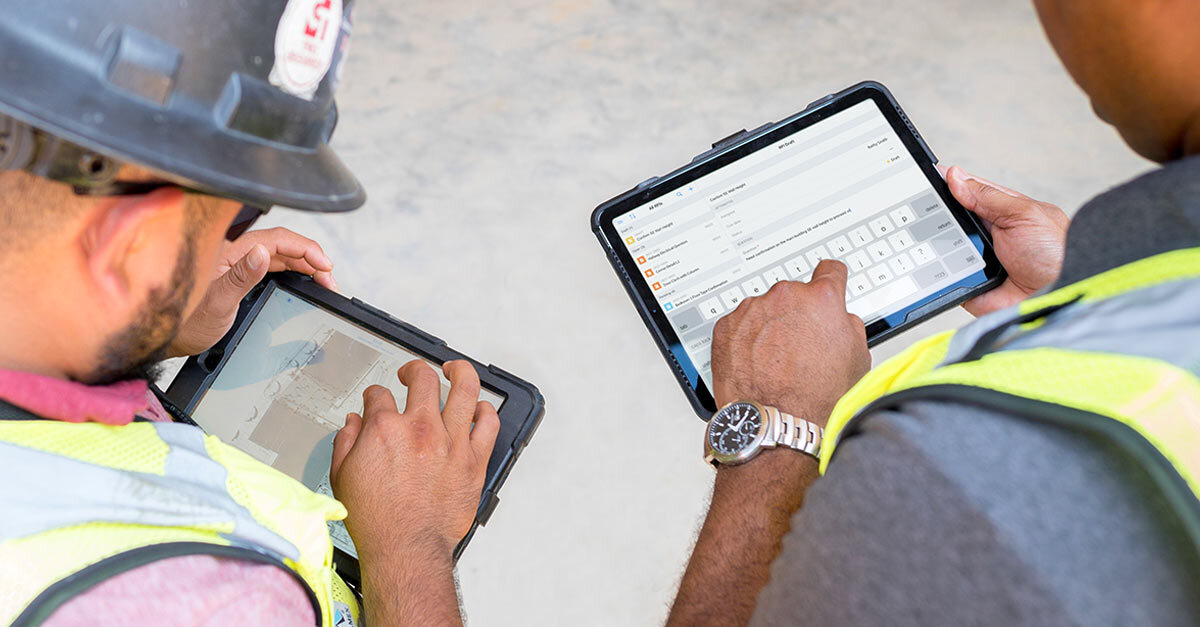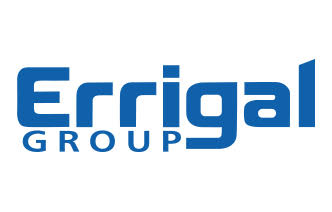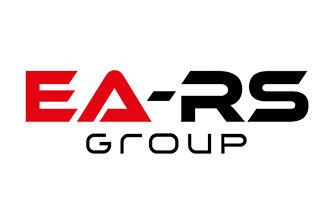Construction daily reports: Best practices for jobsite teams

While filling out a construction daily report (CDR) can be tedious and time-consuming, it’s also inescapable and extremely important. They serve as a record of what happened on the jobsite on a daily basis, and are an essential tool to keep stakeholders informed, track progress, and avoid disputes.
Field management software, like Fieldwire, allows specialty contractors to submit a construction daily report from any mobile device. In just a few minutes, daily reports can be generated from any location in the field — significantly reducing office hours and eliminating the need for emails or calls just to communicate project progress.
In this article, we’ll break down why construction daily logs matter and share best practices for making them accurate, efficient, and easy to manage.
Summary: Construction daily reports
What is a construction daily report? A construction daily report (CDR) is a standardized document that captures jobsite details like activities, workforce, materials, and issues. It provides a daily snapshot of progress for internal teams and external stakeholders.
What should be included in a daily report?
- Date, project name, and weather conditions.
- Workforce details (subcontractors, headcounts).
- Work performed and key progress updates.
- Materials and equipment used or delivered.
- Safety incidents, delays, or issues.
- Photos or attachments for context.
Benefits of daily reports
- Minimize disputes and claims with detailed records.
- Improve team communication and coordination.
- Save time and reduce errors - especially with digital tools.
- Build client trust with professional, consistent reporting.
Make reporting effortless with Fieldwire Fieldwire simplifies daily reporting with mobile tools that let teams document, share, and store daily reports in real time - keeping your projects on track and your teams aligned.
What is a construction daily report?
A construction daily report as a record of field notes, including work completed, weather conditions, and materials delivered or used onsite. Daily reporting keeps the project management team — including the owner and general contractor — informed and aware of project progress. More importantly, daily reports can save key stakeholders a lot of time and money when the information contained in them is used to resolve litigation disputes.
What is the purpose of a construction daily report?
At the end of a work day, a lot has happened on the jobsite. A construction daily report ensures all stakeholders are up to date on the progress of the project, even if they were not present on the jobsite.
Construction daily reports are created to:
- Document day-to-day site activities in a consistent, standardized way.
- Serve as an official record for internal tracking and external accountability.
- Keep management and stakeholders informed of jobsite conditions.
Daily logs are an essential part of the construction workflow, as they help superintendents and managers track labor, equipment, materials, and delays. The information contained in the reports can be used to revise schedules and make the necessary adjustments to keep projects running smoothly and efficiently.
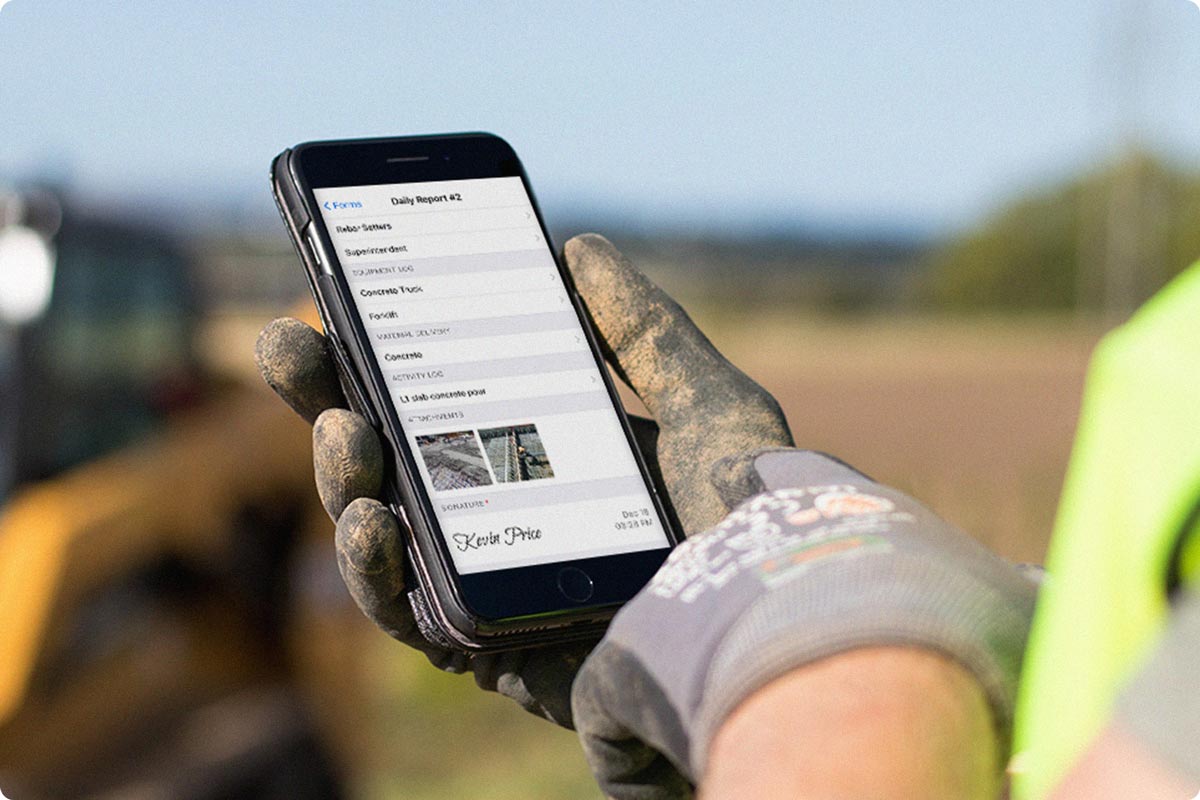
Who should make the reports?
Daily reports are typically prepared by site supervisors, foremen, or project managers, as they are directly responsible for overseeing daily operations and workforce activities. On larger projects, field engineers or other designated staff may also contribute, particularly when specialized input or technical details are required.
Regardless of who completes the report, it is essential that the individual has firsthand knowledge of the day’s site activities, progress, and issues to ensure the record is accurate and useful.
What should be included in a construction daily log?
The key elements that should be included in a construction daily report are:
- Date, project name, weather conditions
- Workforce on site (subcontractors, number of workers)
- Work performed and progress notes
- Materials and equipment used or delivered
- Safety incidents or delays
- Photos or attachments for context
Having a template for daily logs helps ensure no important information is missing, and standardizes the process. Construction management software makes report creation easy by providing daily log templates that managers can use to quickly fill in with project details.
What are the benefits of daily reports?
More than a task, daily logs can drive productivity by identifying patterns and issues early. Conversely, poor daily logging practices are a hidden risk, since missed details can cost millions in claims.
It’s important to implement thorough daily reporting practices so construction teams have the information they need to prevent problems down the line, and also gather insights to improve efficiency. There are many advantages to doing daily construction reports well:
- Reduce disputes and claims through detailed documentation.
- Improve team coordination and communication across roles.
- Save time and cut errors when using digital tools.
- Enhance client trust with professional, consistent reporting.

How Fieldwire helps create daily construction reports
In a nutshell, Fieldwire daily reports are designed for jobsite workers and office teams to document work in a convenient and straightforward manner. Using Fieldwire’s customizable construction daily report templates, a project manager or superintendent in the office can assign a daily report to a foreperson or specialty contractor in the field.
They receive a notification in real-time on their phone or tablet to complete a daily field log and submit it. From within the Fieldwire construction management app, the contractor can instantly fill out a construction daily report to include important information, such as:
- Weather conditions, which can be input manually or automatically generated based on the project’s location.
- Information about schedule delays, conditions, accidents, and equipment or materials used.
- A log of work that was undertaken, including who did it, the time it took them, and any other additional notes. This information can also be reported in a time and materials (T&M) form, also supported in Fieldwire.
- Attachments such as photos and files that support the work log.

Once all information for a daily report is supplied by the contractor, they can instantly notify the team in the office by clicking ‘submit’ within the Fieldwire construction forms app. The office team can generate a PDF report and send it to various stakeholders in just a few minutes — so no more hours wasted at the end of the day manually compiling lengthy reports!
Daily reporting best practices
When choosing a construction daily report app, check that it supports these seven daily reporting best practices to ensure construction projects progress smoothly:
- Use templates. Using standardized templates for daily logs ensures that no important information is overlooked while keeping the reporting process consistent across the project. It also speeds up the process, making reporting more efficient.
- Automatically dated and organized reports. Trying to locate a daily report from days, weeks, or months ago is going to be extremely painful if you don’t have an organized history of reports. Just including the date on each report isn’t enough; you also need a searchable index in a single daily reports online database.
- Weather conditions. An accurate log of weather conditions can help jobsite teams explain construction delays and/or future defects, and should be automatically included based on location. If, for example, heavy rain impacts a general contractor’s trenching and shoring schedule, team members can look back at their daily reports and validate the necessary steps to get back on track.
- Clearly defined work completed. For key stakeholders to understand what progress is being made each day, workers must list all tasks completed (plus how long it took them to do each one) in a daily work log. This way, craftspeople in the field take ownership for their work and the owner’s office teams have a sense of project progress without physically being onsite.
- Detailed documentation. Before submitting your construction dailies, make sure you have included enough information — including files and project photos. This eliminates unnecessary questions being asked post-submission.
- Favor digital over paper. Paper reports get the job done, but can be lost or misplaced. With construction management software, you can easily search for specific information, quickly share daily logs with stakeholders, and avoid mistakes or oversights with real-time data entry.
- Keep reports clear and concise. You should be as thorough as possible when creating daily logs, but that doesn’t mean you need to write long narratives. Stick to objective details and focus on key points with short, factual notes.

Streamline your construction daily report process
Accurate daily reporting is essential for the success of any project. But completing a construction daily report doesn’t have to be tedious and time-consuming. With Fieldwire, you can create effective daily logs in minutes and share them instantly with stakeholders.
Digital daily logs aren’t just faster, they also add value with real-time collaboration, photo attachments, and searchable records. Use construction management software to streamline reporting and improve communication across teams.
Daily reports are just one of six form types offered by Fieldwire’s construction forms app. Learn more about Fieldwire’s forms here.


